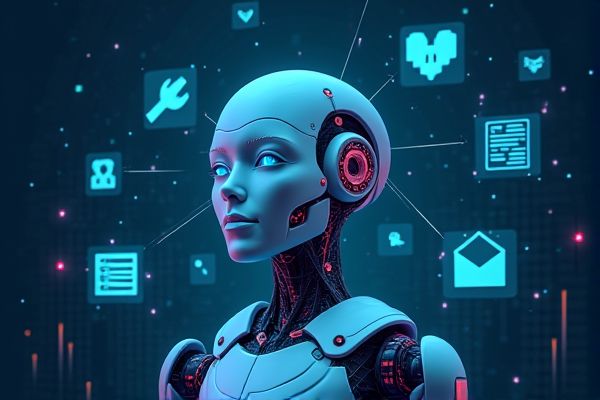
AI enhances talent acquisition by streamlining resume screening processes, enabling recruiters to swiftly identify suitable candidates. Natural language processing (NLP) technologies analyze job descriptions and candidate profiles, ensuring a better match based on skills and experience. Predictive analytics tools forecast candidate success by evaluating data trends, improving decision-making for hiring managers. AI-driven chatbots also facilitate engaging communication, providing timely updates and answering candidate inquiries, enhancing the overall candidate experience.
AI usage in talent acquisition processes
Candidate Screening Automation
AI usage in talent acquisition processes can streamline candidate screening by efficiently analyzing resumes and identifying top candidates. For example, tools like HireVue utilize machine learning to assess applicants' video interviews, enhancing recruitment speed. Automating repetitive tasks increases the chances of finding qualified candidates while reducing human bias in selection. This approach not only saves time but also allows HR professionals to focus on strategic decision-making.
Predictive Analytics for Hiring
AI in talent acquisition can enhance the efficiency of predictive analytics for hiring by analyzing large datasets to identify the best candidates. This approach allows organizations to uncover patterns and trends in applicant performance, which can lead to better hiring decisions. For example, platforms like LinkedIn utilize such technologies to provide insights into candidate suitability based on their profiles and previous hiring outcomes. Leveraging AI tools can increase the chances of matching candidates with job roles that align with their skills and company culture, ultimately optimizing the recruitment process.
Bias Reduction in Recruitment
AI can enhance talent acquisition by analyzing large volumes of candidate data, which may lead to more objective evaluations. The use of AI tools helps identify and reduce biases that often influence hiring decisions, promoting diversity in workplaces. For example, companies like Unilever have implemented AI-driven assessments to minimize subjective judgment in recruitment. This may result in a broader talent pool and improved hiring outcomes, benefiting the organization overall.
Virtual Interview Platforms
AI can streamline talent acquisition by enhancing candidate screening and matching, increasing the chances of identifying suitable applicants. Virtual interview platforms leverage AI to analyze candidate responses, which may lead to improved hiring decisions. Companies like HireVue exemplify how these technologies can reduce time-to-hire while maintaining quality. The potential for AI to minimize bias in recruitment adds an advantage that can result in a more diverse workforce.
Natural Language Processing for Resume Parsing
AI can streamline talent acquisition processes by improving efficiency in candidate selection. Natural Language Processing (NLP) enables automated resume parsing, allowing recruiters to quickly identify suitable candidates based on specific job requirements. This technology can enhance the recruitment experience by reducing the time spent on manual screening. Companies like IBM have harnessed NLP tools to gain a competitive advantage in their hiring practices.
Employee Retention Prediction
AI in talent acquisition processes can enhance candidate screening by analyzing data from various sources to identify the best fits for job roles. Employee retention prediction models use historical performance and engagement data to forecast which employees may be at risk of leaving. For example, companies like IBM utilize machine learning algorithms to assess employee satisfaction and turnover likelihood. This application of AI could lead to more informed hiring decisions and improved employee retention strategies.
Enhanced Candidate Experience
AI integration in talent acquisition can significantly enhance candidate experience by streamlining the application process. For instance, recruitment software like Greenhouse can automate resume screening, reducing time-to-hire. This technology may also personalize candidate interactions, making them feel more engaged. Implementing AI tools can provide organizations with insights into candidate preferences, potentially improving overall satisfaction and fit.
Skill and Role Matching Algorithms
AI can significantly enhance talent acquisition processes through skilled role matching algorithms, which analyze candidate profiles against job requirements. These algorithms can increase the likelihood of finding ideal candidates, reducing the time spent on screening applicants. For example, a company like Google might use these technologies to streamline recruitment, ensuring a better fit for their diverse roles. Implementing such AI solutions may provide a competitive edge in attracting and retaining top talent.
Sentiment Analysis for Employer Branding
AI can significantly enhance talent acquisition processes by streamlining candidate sourcing and selection. For example, implementing sentiment analysis tools can provide insights into employer branding by analyzing candidate feedback and public perception. This data-driven approach increases the likelihood of attracting top talent that aligns with the company culture. Organizations like Google have successfully used similar methods to improve their hiring strategies.
Data-Driven Decision Making in HR
AI in talent acquisition can streamline candidate sourcing and enhance the screening process, potentially reducing time-to-hire. Companies like Google utilize data-driven decision-making to analyze candidate performance and improve hiring strategies. This approach increases the chances of selecting the best fit for job roles, thereby enhancing team performance. Leveraging predictive analytics can offer HR departments actionable insights, allowing them to better understand workforce trends and improve overall recruitment outcomes.
 techknowy.com
techknowy.com